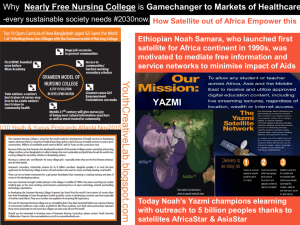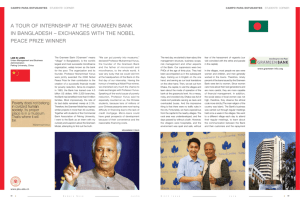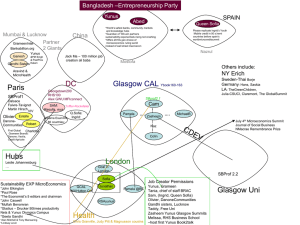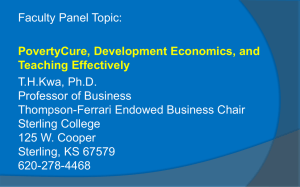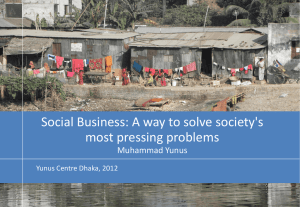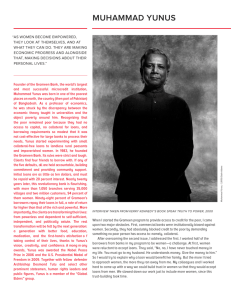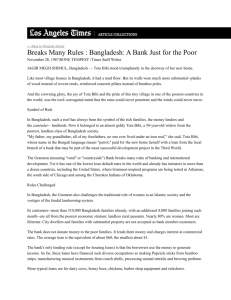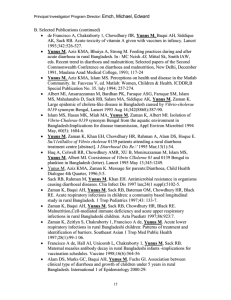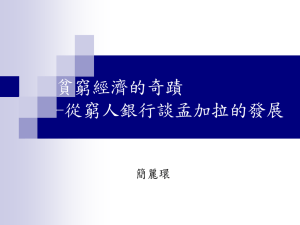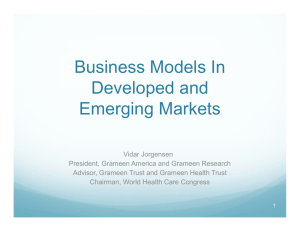social business investments in hubs linkedin to The Economist`s
advertisement
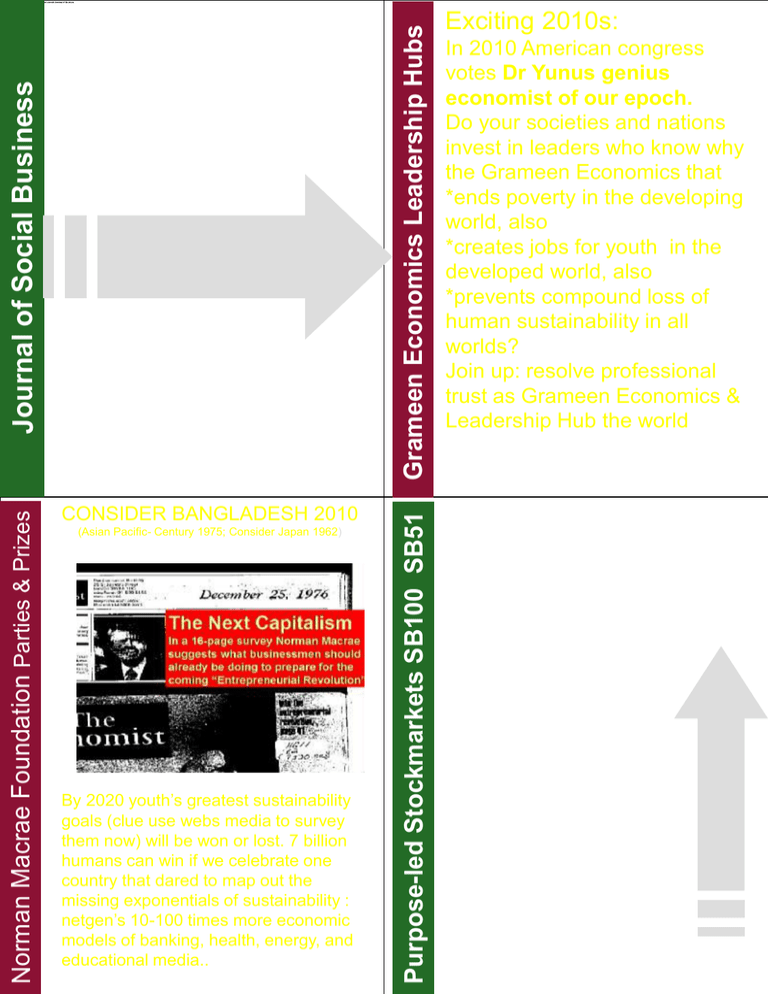
Grameen Economics Leadership Hubs (Asian Pacific- Century 1975; Consider Japan 1962) By 2020 youth’s greatest sustainability goals (clue use webs media to survey them now) will be won or lost. 7 billion humans can win if we celebrate one country that dared to map out the missing exponentials of sustainability : netgen’s 10-100 times more economic models of banking, health, energy, and educational media.. Purpose-led Stockmarkets SB100 SB51 Journal of Social Business Norman Macrae Foundation Parties & Prizes CONSIDER BANGLADESH 2010 Exciting 2010s: In 2010 American congress votes Dr Yunus genius economist of our epoch. Do your societies and nations invest in leaders who know why the Grameen Economics that *ends poverty in the developing world, also *creates jobs for youth in the developed world, also *prevents compound loss of human sustainability in all worlds? Join up: resolve professional trust as Grameen Economics & Leadership Hub the world September 2010 , US Congress Votes For Economic Genius of our Generation Rush Holt, New Jersey – Award Congressional Gold Medal to Economic Genius, Muhammad Yunus I rise in strong support of this legislation to award Dr Muhammad Yunus the congressional gold medal ; the house has garnered 297 bipartisan sponsors of this bill; Muhammad Yunus is widely known as banker to the poor and is one of the world’s great humanitarians, and an economic genius In 1974, as Bangladesh was struggling with terrible famine, this professor of economics led his students out of classroom and into village near by, there they discovered impoverished people could not get ahead because of the oppressive business practices of money lenders who exploited their poverty and desperation; with just $27 Yunus liberated 42 victims of these unfair practices From this first experience, with the power of small amount of money, yunus developed the concept of microcredit; with just a few dollars to work with the poor are able to become entrepreneurs; they sell vegetables or clothing or other handmade goods and other products in order to slowly generate and accumulate profits; or they devise clever service industries with the cell phone or a computer that they can buy with the microloan; and it turns out that the poor are wary of debt , and are careful stewards of money; repayment rates of microloans are consistently near 97%, and step by step these borrowers build individual ladders on which they can climb out of poverty and into mainstream economy Within few years of his first trip to that destitute village, yunus created the Grameen Bank to act as bank to the poor in Bangladesh ; today Grameen Bank has over 2500 branches, it serves more than 8.3 million people, in over 81,000 villages; it has dispersed nearly 10 billion dollars to the poor; it is estimated that more than 60% of Grameen Bank’s borrowers have crossed the poverty line; many of these re women Over the last 3 decades yunus has made the elimination of poverty his life’s work, and the concept of microcredit has been widely adopted and the field now serves the poor with a portfolio of financial services including savings accounts , insurance, fund transfers, education loans, pensions ... Microfinance institutions now serve over 160 million people in developing countries; women who make up 60% of the world’s poorest citizens and disproportionately shoulder the burdens of poverty receive over 95% of the microloans; the funds allow them to increase their independence and improve the quality of life of their entire families; children of borrowers are more likely to attend school and enjoy better nutrition. Yet even with these accomplishments, there is more to be done. There are 2.6 billion people round the world who live on less than $2 a day; and the poorest 1.4 billion live on less than a dollar and a quarter per day Microfinance still needs to take deeper root in Africa where 75% of the population live on less than $2 per day; we must commit ourselves to addressing their needs and microfinance can be key component of that work; Muhammad Yunus and those who have followed in his footsteps have made it possible for the working poor to turn into an entrepreneurial middle class and for beggars to become business people Yunus has been recognised with the Nobel prize for peace and the US presidential medal for freedom; he continues to challenge economic preconceptions and the acceptance of poverty around this world. We wish to further honor his achievements, and to support his extraordinary vision of making poverty, as he spoke in Oslo, a concept that future generations may understand only by visiting a museum Spencer Bachus, Alabama – Overdue recognition of a vastly important concept: what credit can do Over the last couple of the years we have talked about the effects of the recent economics crisis, and how it has limited our ability to procure loans in this country. We all know that credit is the lifeblood of both business and daily life. And that businesses need capital to invest in tools, labour and raw materials and that in individuals need credit for short term needs and long term investments such as education. The need to free up credit in the USA is important in this country , but it is easy to lose sight how serious the need for credit is elsewhere - there it is sometimes a matter of surviving or being able to eke out a living. It is a testimony to the man we honor today that he both recognised the needs of many for loans of very small amounts of money and devised a system that can be replicated anywhere to address that need. In the years since the founding of Grameen, the model has blossomed in projects ranging from information technology and communications to food production with partners ranging from small local companies to giant multinationals. One project has funded installation of nearly half a million small solar electrical plants producing power for off the grid people in Bangladesh. I remember reading the book by Robert Caro about Lyndon Johnson and what electricity meant to the hill country of Texas- the miracle that we saw in America a century ago is being repeated in these countries now: the miracle of electricity. This microlending model is not confined to small or developing countries, it has found its way to Canada and even the United States . Dr Yunus holds out the possibility that another offshoot he calls Social Business might be a way to help redevelop Haiti and bring its people out of poverty , as well as in developed countries to provide a path to help the poor become self-supporting without the need for welfare. Through all of this Dr Yunus has been not only a visionary innovator but tireless advocate for the model that demonstrates how to end poverty. Let me conclude by saying this bill is an overdue recognition of a vastly important concept and the man who devised it. Grameen Economics Leadership Hubs Source grameeneconomics .com .net .org 2010 Genius Economics What system could $2.7 bn or $27 tn $27 Q4 How can we hub Social Business & Grameen Economics so net generation sustains 10 times more productivity and the 2010s is celebrated as decade of performing the most exciting goals? 1976 Meta-hubs Q1 How do parties & SB prizes League of 100 mn Q2 In developed nations, job creators of Norman Macrae Foundation the best job creation prolong EE -network & EE -family stimulus can be assembling gossip round best long-term stockmarkets of long-term news headlines: purpose-true organisations. Since 2008 Consider Bangladesh How? Since 1984 Consider www Since 1976 Consider Entrepreneurial EntrepreneurialRevolution Revolution GO microeconomic before race to global 1975: 1976-2075 is Asian Pacific Century Since 1962 Consider Japan Since 1962 Elderly macroeconomists are the greatest danger to economics for next generation Since Purpose-led Stockmarkets SB100 SB51 Journal of Social Business Norman Macrae Foundation Parties & Prizes Q3 Can we put first issue of economics for youth on desk of 2000 leaders dr yunus most wants to social action with? Best News from USA in M3: US congress votes to hear from economics genius Muhammad Yunus 23 S 2010 From social services run by state to social businesses empowered by community Grameen Economics Leadership Hubs Purpose-led Stockmarkets SB100 SB51 How do we serve needs of world’s only genius economist? SB Model: Extraordinary purposeful innovation supported by mediating what cultural & constitutional conflicts needed resolving before scaling up SB100 model is benchmark for ending poverty in developing world but what could be benchmark model for next google or greatest energy start up when its founding entrepreneurial team needs rapid scale up investment? In developed world –is there a case for SB51! SB100 •Trusting to entrepreneur inside (ie where up to 49% is owned by purposeful every being founders and investors, but everything else is •Positive cashflow map legally required to be like SB100) •No dividend- thus relentless investment in purpose •Constitution of 100% ownership by (or in trust for) poorest (or those in greatest need of the organisation’s unique purpose compounding sustainability’s exponential rising across generations) •And joy of value multiplying multi-win model that does no harm 2010 Genius Economics What system could 1976 $27 mn or $27 tn $27 Would give the next person who invents a google another choice than SB100 or SB0. Moreover if we are to go way above zero-sum with knowledge models that multiply value for every user of the knowledge, perhaps sharing one “doubling” between founders circle and neediest is less of a conflict than failing to show developed world that knowledge age’s 10-50 times more productivity is possible. This failure is depressing use of tech to create jobs Would give those founders of collaboration network productivity models who currently have developed extraordinary equity but now need capital to scale up or to stay ahead of being copied another choice (I believe www.the-hub.net may want to ask your advice on live case of this) As well as developing world millennium goals, SB100 best model where funds or assets come from: •What would otherwise be charity & volunteers •Privatization in the sense of transferring social service ruled by state to social busies empowered by community If public awareness is to be built fast enough to challenge each global market currently led by organisations compounding market’s greatest risk to sustainability, would give peoples chance to put in a fast benchmark of where market could go, must goone that a daring nation with public broadcasting would give free speech to •SB100 is also only morally right model where all the work and resources re being done in local communities – ie no siphoning out by already rich capitals from those places that are either poorest or at most sustainability risk Gives chance to form professionals 2.0 around edging out professionals who have lost their hippocratic oath but still have quasi-monopoly to rule. This new sector could be huge revenue earner for Grameen whose Genius Economist leads its hippocratic oaths $100,000 of Social Business Loans to Glasgow, projects -where else to invest $300 K of Norman Macrae’s estate? Grameen Economics Leadership Hubs Journal of Social Business How do we serve needs of world’s only genius economist? Best News from USA in M3: US congress votes to hear from economics genius Muhammad Yunus 23 S 2010 Source grameeneconomics .com .net .org 2010 Genius Economics What system could 1976 $2.7 bn or $27 tn $27 1. Last economist to practicesmodels (SB) directed at 10 times more economic community productivity and network futures which youth’s jobs need to create 2..Keynes : Economics Rule the world …but with what Purpose, do we want to be ruled exponentially by: creating jobs or destroying jobs? Supporting actions: •About $100K of SB Loan to JOSB & Yunus/GrameenScotland •Results sampling 300 congressmen with yunus1000 books League of 100 mn job creators •16 Nov 2010 First Entrepreneurial Revolutionary Party @ The Economist for decades – see next page Purpose-led Stockmarkets SB100 SB51 Norman Macrae Foundation Parties & Prizes Meta-hubs In developed nations, the best job creation stimulus can be assembling stockmarkets of long-term purposetrue organisations. How?
